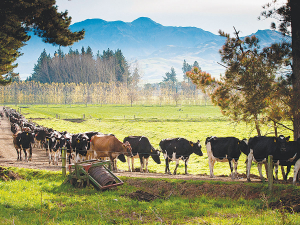DairyNZ Calls for Changes to Government’s Proposed Resource Management Act Reform
DairyNZ says the Government’s proposed Resource Management Act reform needs further work to ensure it delivers on its intent.
 The report by DairyNZ and LIC shows the dairy sector’s resilience with production remaining stable despite tight and uncertain economic conditions.
The report by DairyNZ and LIC shows the dairy sector’s resilience with production remaining stable despite tight and uncertain economic conditions.
OPINION: The latest New Zealand Dairy Statistics report paints a picture of an industry trending towards fewer but larger herds.
Farmers are focused on rearing high-producing cows with good milk quality. This is shown by record-high percentages of milkfat and protein in herd-tested cows, alongside the lowest-ever average somatic cell count of 161,000 cells/ml in the 2023-24 season.
The report by DairyNZ and LIC show the dairy sector’s resilience with production remaining stable despite tight and uncertain economic conditions.
In 2023-24 season, dairy companies processed 20.5 billion litres of milk containing 1.88 billion kgMS - compared with the previous season, this was a 0.8% (161 million litres) decrease in litres and a 0.5% (9 million kgMS) increase in kgMS processed. This reflects a greater proportion of milksolids in the milk processed.
Average milk production per cow across the country was 400kg of milksolids (made up of 225kg milkfat and 176kg protein). Average milksolids per effective hectare (1105kg) was near 2020/21 levels.
Cow numbers increased by 0.6% in 2023/24, reaching 4.70 million, though this is still 2% below the five-year average of 4.8 million. The average herd size increased and the number of herds decreased. There were 10,485 herds this season – 116 fewer than the previous season. The national average herd size was 448, which was seven cows more than the previous season.
The national herd composition has evolved, with a growing preference for crossbreed genetics. The proportion of Holstein- Friesian/Jersey Crossbreeds has increased significantly, from 34% in 2005/06 to 60% in 2023/24.
DairyNZ says structural and genetic trends underscore the resilience and adaptability of the New Zealand dairy sector, which clearly focuses on productivity, quality, and sustainable performance.
OPINION: "We are back to where we were a year ago," according to a leading banking analyst in the UK, referring to US president Donald Trump's latest imposition of a global 10% tariff on all exports into the US.
DairyNZ says the Government’s proposed Resource Management Act reform needs further work to ensure it delivers on its intent.
Overseas Trade Minister Todd McClay says he's working constructively with the Labour Party in the hope they will endorse the free trade agreement (FTA) with India when the agreement comes before Parliament for ratification.
Donald Trump's latest tariff tantrum has again thrown the world of trade into a new round of turmoil and uncertainty, and NZ is caught up in it.
The third edition of the NZ Dairy Expo, held in mid-February in Matamata, has shown that the KISS principle (keep it simple stupid) was getting a positive response from exhibitors and visitors alike.
Twenty years ago, South African dairy farm manager Louis Vandenberg was sent to a farm in Waikato to provide training on Afimilk technology.
OPINION: One of the world's largest ice cream makers, Nestlé, is going cold on the viability of making the dessert.
OPINION: Is it a case of over promising and under delivering? Farmers think so.